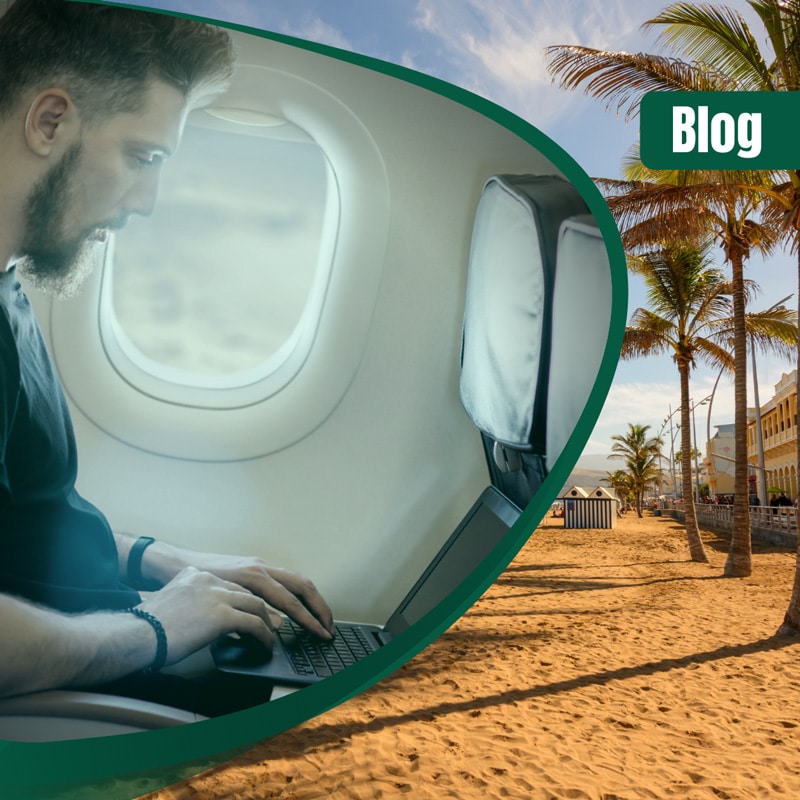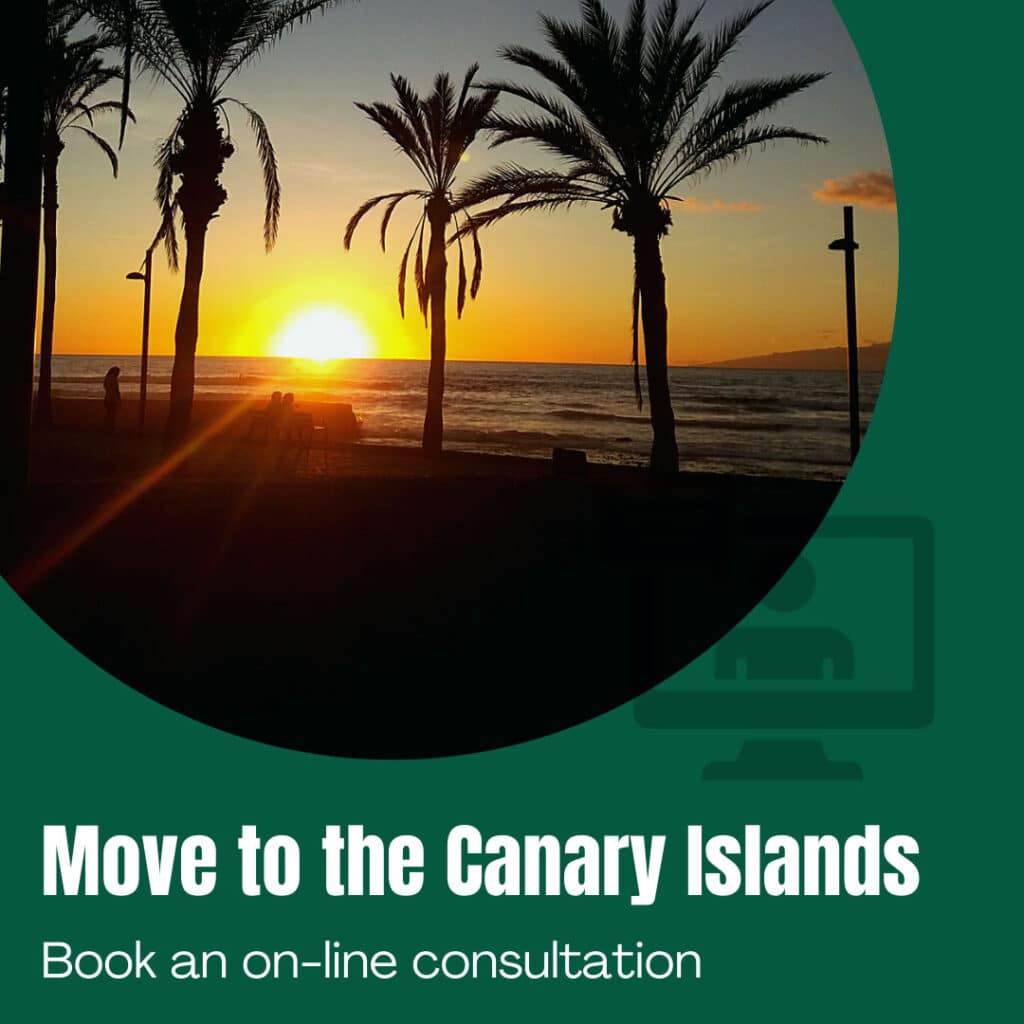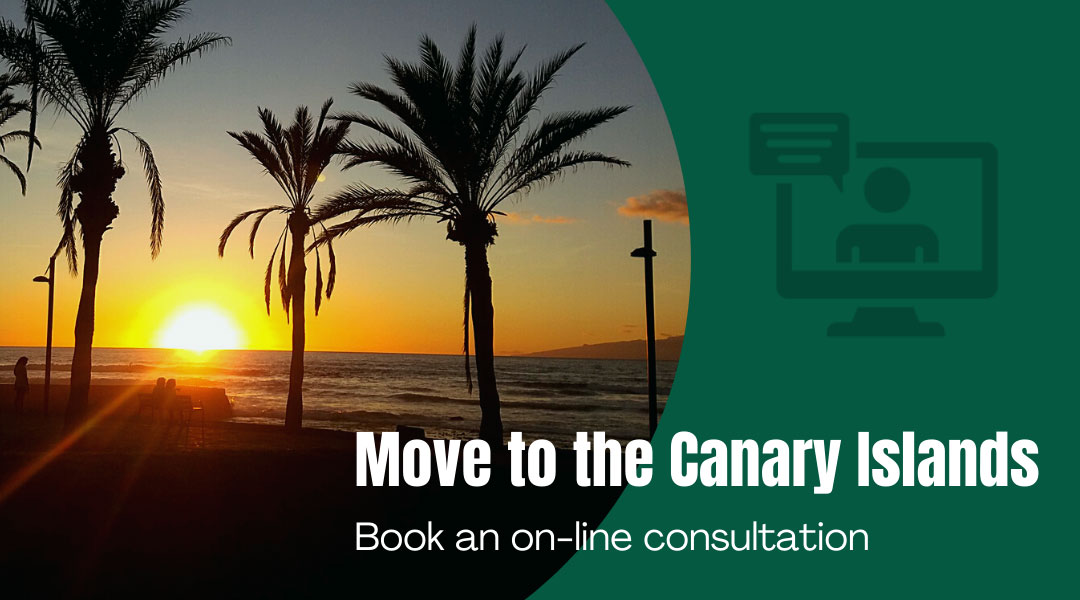

Working remotely from the Canary Islands
Post-COVID guide
In this article you will find a lot of useful information on how to prepare for your journey and working remotely from the Canary Islands. You will also learn which island to choose, when to go, how to arrange accommodation, what the costs of living are and many other useful tips.
The information and tips in the article result from my experience working remotely in the Canary Islands. I’ve lived here for almost six years, four in several towns in Tenerife and currently it’s my second year in Gran Canaria.
Working remotely from the Canary Islands
Post-COVID guide
In this article you will find a lot of useful information on how to prepare for your journey and working remotely from the Canary Islands. You will also learn which island to choose, when to go, how to arrange accommodation, what the costs of living are and many other useful tips.
The information and tips in the article result from my experience working remotely in the Canary Islands. I’ve lived here for almost six years, four in several towns in Tenerife and currently it’s my second year in Gran Canaria.
First-hand, solid info about working remotely from the Canaries
For almost 20 years I’ve been working as a freelancer and as an employee of advertising agencies, software houses, media houses and corporations as a project manager, marketing specialist, strategist and content creator. I’ve been working remotely for over ten years. I know the digital nomad community on the islands very well.
I believe that my experience and knowledge can be useful to those who are planning to come to Tenerife or Gran Canaria to live and work remotely in the post-COVID reality. This is 100% reliable and self-tested information. Enjoy your reading.
How to start? Planning a trip to the Canary Islands.
We assume that:
Group 1: Nomad in pursuit of adventure and sun – fun solo stay, for up to 2 months
Group 2: Remote worker fleeing winter – staying solo or with a partner for up to 3 months
Group 3: Remote worker deciding on a long stay – permanently or at least for a year, with the family
Group 1: Nomad in pursuit of adventure and sun - fun solo stay, for up to 2 months
Group 2: Remote worker fleeing winter - staying solo or with a partner for up to 3 months
Group 3: Remote worker deciding on a long stay - permanently or at least for a year, with the family
Regardless of which group you belong to, the first questions that arise are:

Regardless of which group you belong to, the first questions that arise are:
01. Working remotely from Tenerife or Gran Canaria?
For the first two groups, each of the locations is an ideal place for a holiday and work trip. In the case of the third group we are talking about the so-called “ground testing” for a longer stay, so the situation is a little different.
Group 1: Nomad in pursuit of adventures and sun, whose priority is to work around the beach, sightseeing, meeting people, surfing course (or other sport), fast internet, low cost of living and cheap partying, should choose:
- South of Tenerife – towns of Las Americas, Los Cristianos and El Medano
- North of Tenerife – Puerto de la Cruz (in winter weather can be worse)
- North of Gran Canaria – city of Las Palmas
Group 2: Remote worker fleeing winter, whose priorities are similar to Group 1, should choose:
- South of Tenerife – towns of Las Americas, Los Cristianos and El Medano
- South of Gran Canaria – town of Maspalomas
Group 3: Remote worker deciding on a long stay, who will additionally need to live close to civilisation, constant medical care, safe facilities for the family, comfort of life and a good base to get to any part of the island, should choose:
- Tenerife – the cities of El Medano or Los Cristianos, Las Americas (or the surrounding area) if their priority is surf, windsurf, kite and they do not mind the ubiquitous tourism
- Tenerife – the cities of Puerto de la Cruz, Santa Cruz, Adeje – it is calmer there, away from the tourist madness
- Gran Canaria – the city of Las Palmas (in my opinion the optimal destination)
02. When is the best time to come?
Group 1: Nomad in pursuit of adventure and sun, who takes off on a whim when there are travel-enabling funds or their prospect. In the locations suggested above, at any time of the year, there is a guarantee of sun, party options, a full package of island attractions and adequate facilities for remote work.
Group 2: Remote worker fleeing winter, plans to leave during the cold months in Europe, October – March.
Group 3: Remote worker deciding on a long stay – the date of departure doesn’t matter here, as their aim is to stay for a minimum of one year in one or more places on the island.
03. What's the cost of the trip?
Group 1: Nomad in pursuit of adventure and sun and Group 2: Remote worker fleeing winter – spend from 100 to 300 EURO per person depending on luck and commitment in search of flights (the cost of a round trip). More luggage will be a small additional cost.
- Tip # 1: look for charter connections with tour operators
- Tip # 2: book your ticket at the last minute when the price is lowest
- Tip # 3: use public transport from airports – it is efficient and cheap
Group 3: Remote worker deciding on a long stay only considers the cost of a one-way flight on a charter flight with as much excess baggage as possible. Cost up to 250 EURO per person. We do not take into account ferry transport, which is connected with a car trip through Europe and then entails a long ferry crossing, etc. Here, we want you to get to the island as quickly, comfortably and with as much luggage as possible.
04. What to bring?
In this case the answer is similar for all three groups. We take everything essential for our remote work. It is necessary to remember that many things on the island can’t be bought off the shelf or will be much more expensive than on the mainland.
Equipment, equipment and equipment again
Equipment for remote work, i.e. a fully operational computer, a new, tested charger, a few flash drives, memory cards, an external drive (I take two with the same backup for peace of mind) and gear to connect to Wi-Fi securely. Other necessary accessories – cables, batteries, etc. Equipped with these, a guarantee of remote work and a credit card with enough to survive on, you will get by, even in the most difficult moments.
Health insurance
Small price for peace of mind in the event of unpleasant, unforeseen situations. Mandatory!
COVID test plus app
Taken at least 72 hours before arrival on the islands along with an app installed on your phone. Currently, this is a requirement.
Clothing - only summer and spring
There is no point wasting space and money for luggage with large and heavy clothes. During the annual stay on the island, you will only wear them a few times or not at all. It’s either summer or spring on the islands. If it gets cold, buying cheap, warmer things won’t be a problem. Similarly, towels, cosmetics, etc. can be obtained locally at the same or lower prices.
Sports equipment
If it is not your specialised equipment, and more like a fad do not take it. You can buy or rent all kinds of equipment for sea, air or land activities.
In case of Group 3: Remote worker deciding on a long stay – can use the possibility of transporting sports equipment by adding as much additional luggage as permissible.
Medicines
If you need specialised drugs, buy them before departure and carry them in your luggage. It can be problematic to get prescriptions locally and the cost of drugs are higher.
05. Where to live?
Group 1: Nomad in pursuit of adventure and sun, for whom sunny location and fast Internet at the lowest possible cost are priorities, should choose a room in a larger apartment or villa with a group of like-minded people. The fastest option to find an attractive place, and often also cool companions for work and more, are groups of digital nomads on social media. Housing ads are regularly posted there. It is worth trying to ask on the forum if anyone is looking for a roommate. It works. The monthly rental cost should be €300-500 per person.
Group 2: Remote worker fleeing winter chooses the above option or looks for accommodation on real estate websites such as idealista or milanuncios. You can also try booking through Airbnb.
In both cases, the prices are unlikely to be much lower than a holiday rental. It is possible to get up to 20% discount. You’ll have to pay a monthly deposit. In the case of an agent, an additional commission cost – up to a maximum of a month’s rent.
The price of renting an apartment for a short period in the locations mentioned above will not be lower than €800 per month. A high-standard apartment can be found in the €800-1200 per month range. The price should include the cost of utilities and good quality internet.
Some verified Facebook groups for remote workers in Gran Canaria and Tenerife:
Note: let’s not get too excited about the prices of long-term apartment rentals. A short stay (less than a year) is not treated similarly in terms of cost. Of course, in colder locations in winter and around airports, highways, colder places on the island, the cost of accommodation will be lower. However, if you care about the comfort of your stay, when you want a summer feeling in winter, I suggest you give up on these options. In most of these cases, it will be a disappointment when you see the property in reality.
In case of Group 3: Remote worker deciding on a long stay –individually searches the websites dedicated to the real estate rentals on the islands: idealista or milanuncios.
Another option is to use the companies supporting relocation and your new life in the Canary Islands such as Canary Islands Space. These companies:
- will plan and support the relocation,
- will find accommodation and solve all related problems during your stay,
- sort out all additional issues such as childcare, recommendations for kindergartens or schools and care for the disabled or the elderly,
- prepare and submit the necessary documents for a longer stay on the islands, company registration, etc.,
- will advise or organise all the attractions and leisure activities,
- will help with learning Spanish.
The monthly cost of renting a property for an annual stay in the previously suggested locations along with the cost of utilities, internet, swimming pool will be €800-1200 and more plus a deposit and a month’s rent commission for the agent.
Important - the Canary Islands are governed by their own laws. One of the best examples of which is long-term housing rental.
You need to know that:
- it is unlikely to be able to rent a property remotely,
- properties disappear from the market very quickly,
- a lot of ads are click bait – they are a decoy to contact the customer,
- most arrangements are made during live meetings or via WhatsApp,
- a large number of documents are often required,
- there are requests for references from previous landlords,
- a request for proof of income or employment contract is not unusual here,
- one or a few months’ deposit is standard,
- there are attempts of extortion and fraud

06. What's the average cost of living?
Monthly costs during an annual stay:
- food and water for two people will be around €300-500 upwards,
- a dinner for two will set you back €30-50 upwards,
- one-time attractions, admission tickets range from €10-50 per person,
- car rental is an average of €25-40 per day,
- bicycle rental – month – €20, year – €40,
- single bus ride: €1.60 or €0.80 (cardholders)
- express bus ride across the island – around €10.
07. Where to work? Home, coworking, cafe or beach?
Work from home or outside?
Group 1: Nomad in pursuit of adventure and sun and Group 2: Remote worker fleeing winter – mostly choose to work from home. For a short stay, this seems to be the best option.
Group 3: Remote worker deciding on a long stay should consider coworking. On the one hand, living and working in the same place can be oppressive, on the other hand, working from a well-chosen coworking center facilitates contact with people and allows you to get to know the island faster – pure benefits.
Remote work from the beach is a myth
To begin with, let’s dispel the myth of working remotely from under a palm tree at the beach. It is neither comfortable, effective nor cheap. It looks nice in photos on social media, but it does not work in reality. The sun reflecting on the screen, sand in the computer, noise around, heat, water, random events, high temperature, poor internet, battery problems – are some of the main reasons that should quickly put this type of remote work out of your mind.
3 reasons why working remotely from a coffee shop is a pain
Of course, I mean long-term, regular work, several days a week, for 5-8 hours a day. We are not talking about a 30-minute cup of coffee, during which we will upload files to the server, content on social media, or send 100 previously prepared e-mails.
- First, long term it is a tiring and ineffective form of work for the workers themselves. Noise, variable internet quality, uncomfortable armchair, unfavorable surroundings, etc.
- Second, it is burdensome for coworkers. Interruptions in the Internet connection, problems with sending large files, the inability to use the camera, screen pixelation and a million other problems extend the length of your tasks, often wasting the time of several other people.
- Third – to put it mildly, it is not very elegant in relation to the owners of the premises. No one will say anything outright, but when you’re laying around your computer, your camera, your chargers, your notes, your big backpack, you’re not their dream customer. Even if you order lunch and 3 coffees during your 5-hour stay, you will still not be welcome. The reason is simple: you occupy space for a few people for a long time, additionally disturbing other customers. A cafe, a bar, a restaurant is not coworking space.
Coworking as an ideal place to work remotely in the Canary Islands
Both in Gran Canaria and Tenerife, you will easily find a large number of well-prepared coworking spaces. They are run by people who know the needs of digital nomads and requirements of work online. Below I present verified, safe and comfortable coworking options in Gran Canaria and Tenerife.
Coworking offices in Gran Canaria:
Coworking spaces in Tenerife:
Dedicated offices for remote workers
In the Canary Islands you will find a lot of offices ready for use right away. Most of them will be well equipped in terms of furniture and work equipment. They are often independent spaces within larger office buildings or commercial premises.
An alternative solution is to find and adapt a house or, for example, a climatic place in a picturesque spot on the island for the requirements of your team. Companies like Canary Islands Space will find the right location, take care of contracts and payment formalities as well as the interior design, according to the requirements of the employees.
08. Relocation, support for remote work and life in the Canary Islands
If you would like to relocate your company or employees to the Canary Islands feel free to contact Canary Islands Space. We help with relocation, organisation of work and life in Gran Canaria and Tenerife.
- We support companies and employees comprehensively preparing workspaces for them in the Canary Islands.
- We open company offices, arrange interiors and create work bases.
- We organise business meetings, other events, support training, provide attractions and demonstrate the beauty of the Canaries.
09. Online consultation for those interested in a trip to The Canary Islands
If you are planning a trip to Gran Canaria or Tenerife and need information on how to plan your stay, contact us. During an online consultation, you will receive all the necessary information which will:
- help you plan your trip,
- facilitate relocation,
- make your stay enjoyable,
- minimise the number of unpleasant surprises and costs.

About the author
Jakub Norek
CEO – Canary Islands Space
Marketing and project manager with several years of experience. Executive producer of events, photo and video sessions. Professional triber with over 10 years of experience in remote work. Has lived on the Islands for 5 years and worked as i.a. marketing director of Loro Parque and Siam Park, world leading amusement parks.
Co-founder of the Canary coworking centres, advertising, SEO and event agencies. Enthusiast of trekking, snorkeling, cycling, skateboarding, surfing, street art, vegan cuisine and all forms of leisure activities.
About the author

Jakub Norek
CEO – Canary Islands Space
Marketing and project manager with several years of experience. Executive producer of events, photo and video sessions.
Professional triber with over 10 years of experience in remote work. Has lived on the Islands for 5 years and worked as i.a. marketing director of Loro Parque and Siam Park, world leading amusement parks.
Co-founder of the Canary coworking centres, advertising, SEO and event agencies. Enthusiast of trekking, snorkeling, cycling, skateboarding, surfing, street art, vegan cuisine and all forms of leisure activities.


